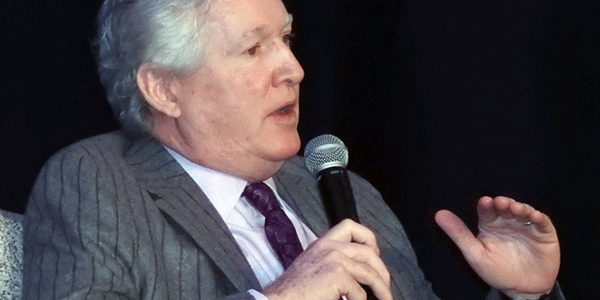By Christen Smith
Exelon leadership told investors last week Illinois’ transition toward 100% carbon-free power can’t succeed without PJM market reforms to keep the company’s nuclear plants running.

Chris Crane, Exelon | © RTO Insider
“The bottom line is fundamental market reforms are needed in the United States if we want to meet the nation’s clean energy climate goals, maintain fuel security and a reliable system,” Exelon CEO Chris Crane said. “We need to sustain and increase electrification [and] preserve a significant economic value through good paying jobs and property taxes. We’ll continue to work at the state level and the national level with both Congress and the administration to make this happen.”
The company’s quarterly earnings report said its Dresden, Byron and Braidwood nuclear plants in Illinois are “showing increased signs of economic distress, which could lead to an early retirement, in a market that does not currently compensate them for their unique contribution to grid resiliency and their ability to produce large amounts of energy without carbon and air pollution.”
Exelon said PJM’s most recent capacity auction in May 2018 “resulted in the largest volume of nuclear capacity ever not selected in the auction, including all of Dresden, and portions of Byron and Braidwood.”
Illinois legislators enacted a zero-emissions credit (ZEC) program in 2016 to rescue Exelon’s Quad Cities plant along the Mississippi River. The company collected $150 million in ZEC revenue for the second half of 2017.
“We are pursuing a number of market reforms addressing the financial challenges many of our [nuclear] plants face,” Crane said. “Against this backdrop, I can also again assure you we will not operate our unprofitable or negative free cash flow plants. You’ve seen us close money-losing plants in the past. You should expect that discipline to continue if reforms are not enacted.”
In the longer term, Exelon told investors the company hopes energy price formation and carbon pricing will help address the market inequities currently hurting its bottom line.
The company’s lobbying for clean energy has produced mixed results, so far. While New Jersey approved $300 million in ZECs last year, Pennsylvania lawmakers stalled a plan that would have added nuclear energy into its alternative energy portfolio and saved the remaining operating reactor at Three Mile Island.
“Either we have a clear path to securing them or the units will be shut down,” said Joseph Nigro, Exelon’s chief financial officer. “We will not damage the balance sheet sitting around for years with negative free cash flow or negative earnings.”
As FERC mulls PJM’s proposed revision of its minimum offer price rule (MOPR) — which would carve out subsidized generation and then adjust clearing prices as if the resources never left — Exelon continues campaigning for clean energy policies in states throughout the PJM footprint. The company’s executive team told investors in Illinois that a coalition of stakeholders wants to expand the state’s clean energy mandate from 25% by 2025 to 100% by 2030 to match other progressive states across the country.
That could be a monumental task under current laws, however.
Last month, the Illinois Power Agency warned that the state only secures about 10% of its power from renewable resources. In an interview with WTTW, Director Anthony Star blamed rate caps and a 2016 energy bill that ramped up the agency’s procurement responsibilities. He said he hoped legislation would fix both issues.
Kathleen Barron, Exelon’s vice president of regulatory affairs, said the Citizens Utility Board, the Clean Jobs Coalition and both the labor and renewable resources industries all stand behind an expansion of the mandate, noting “the consumer advocate is heavily focused on this policy as well because the question of the state having to pay twice for capacity has been very much in the forefront.”
In October 2018, Exelon joined with consumer advocates from D.C. and Illinois, the Sierra Club, the Natural Resources Defense Council, the Nuclear Energy Institute and others to ask FERC for a fixed resource requirement (FRR) mechanism that would allow load-serving entities to satisfy their capacity obligations outside of PJM’s capacity market by procuring capacity from state-supported resources (EL18-178, et. al.).
“There are a number of parties who will come together in the end to help communicate the message that Chris [Crane] mentioned this is important for the state, but it’s not going to be possible if we can’t allow these resources to count as capacity,” Barron said. “And that’s why the FRR is foundational to getting this policy done.”
Earnings Drop
Exelon reported earnings of $494 million ($0.50/share) for the quarter, a decrease from $539 million ($0.56/share) a year earlier. Adjusted operating earnings dropped to $0.60/share from $0.71/share in the second quarter of 2018 as revenue dropped to $7.689 billion from $8.076 billion.
Crane noted the company has filed distribution rate cases for Baltimore Gas and Electric, Commonwealth Edison, and Pepco.
On July 22, Pepco and other parties filed a settlement agreement with FERC for PECO Energy’s formula transmission rate that includes a 10.35% return on equity, including a 50-basis-point RTO membership adder.
Crane said the company was happy with the Trump administration’s decision not to impose quotas on uranium, which he said “would have jeopardized the continued operation of commercial nuclear reactors” in the U.S.



